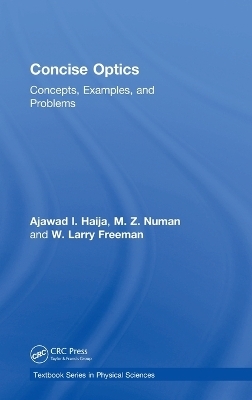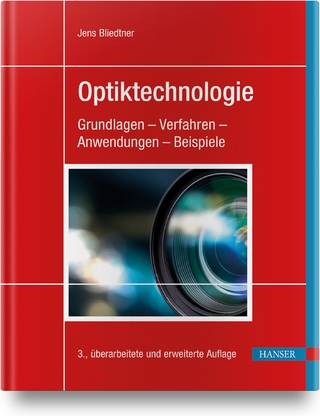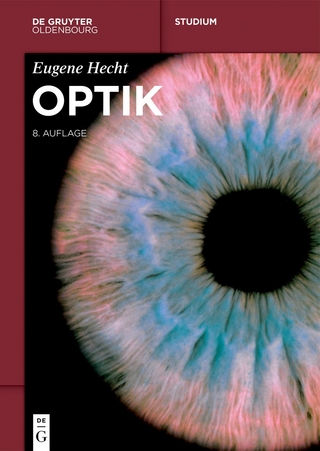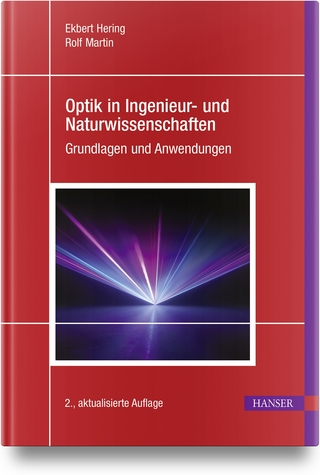
Concise Optics
CRC Press (Verlag)
978-1-138-10712-0 (ISBN)
This introductory text is a reader friendly treatment of geometrical and physical optics emphasizing problems and solved examples with detailed analysis and helpful commentary. The authors are seasoned educators with decades of experience teaching optics. Their approach is to gradually present mathematics explaining the physical concepts. It covers ray tracing to the wave nature of light, and introduces Maxwell’s equations in an organic fashion. The text then moves on to explains how to analyze simple optical systems such as spectacles for improving vision, microscopes, and telescopes, while also being exposed to contemporary research topics.
Ajawad I. Haija is a professor of physics at Indiana University of Pennsylvania.
M. Z. Numan is professor and chair of the department of physics at Indiana University of Pennsylvania.
W. Larry Freeman is Emeritus Professor of Physics at Indiana University of Pennsylvania.
Ajawad I. Haija attended the University of Alexandria in Egypt, where he received his B.Sc. degree in 1968 with distinction, first honor. He received his Ph.D. (1971-1977) at Pennsylvania State University in 1977. In 2000, he moved to the United States and joined the Indiana University of Pennsylvania. He is currently on the physics faculty, where he conducts research on the properties of thin multilayer structures and super-lattices. In 2014 Dr. Haija was awarded the Distinguished Faculty Award for Teaching, 2013–2014, Indiana University of Pennsylvania, IUP. A. J. Haija is a former member of New York Academy of Sciences and a current member of the American Physical Society. M. Z. Numan hails from Bangladesh, where he received his B.Sc. (Hons.) and M.Sc. degrees in physics from Dhaka University. He received his Ph.D. from The College of William and Mary in Virginia in 1982. He taught at Virginia Commonwealth University in Richmond, Virginia, University of North Carolina at Chapel Hill, and Indiana University of Pennsylvania, where he is currently the chair of the department of physics. His research focused on materials modification and characterization using ion implantation, back scattering and channeling; optical and electrical characterization of metallic multi-layers and semiconductor materials; light harvesting through silicon micro and nano structures. W. Larry Freeman was born and grew up in South Carolina, USA, and earned his B.Sc. in physics from Appalachian State University in 1969. Dr. Freeman received his Ph.D. From Clemson University in 1976 where his dissertation explored quantum size effects in thin Bismuth films at low temperatures. After leaving Clemson University and teaching high school and technical college, he returned to Clemson on a post-doctoral position. He joined the US Naval Intelligence service in 1978, and was moved to the US Army Night Vision and Electro-Optics Laboratory in 1980 where he was heavily involved with the development of solid-state materials used for the detection of radiation in the infrared radiation wavelength range. He was instrumental in developing nondestructive testing and characterization as well as fabrication techniques for the manufacturing of solid-state infrared detector arrays. Dr. Freeman moved to Indiana University of Pennsylvania in 1984 where he taught graduate and undergraduate courses in physics. He retired from IUP in 2010 and currently holds the position of Emeritus Professor of Physics. He maintains his memberships in the American Physical Society and American Association of Physics Teachers.
Series Preface: Textbook Series in Physical Sciences
Preface
Acknowledgments
Authors
Section I — Introduction
Chapter 1. Light: Its Nature and History of Study
Section II — Geometrical Optics of Light
Chapter 2. Reflection and Refraction
Chapter 3. Paraxial Rays and Lenses
Chapter 4. Matrix Optics for Paraxial Rays
Section III — Wave Optics
Chapter 5. Light Waves, Properties, and Propagation
Chapter 6. Light Waves, Coherence, Superposition, and Interference
Chapter 7. Double and Multiple-Beam Interference
Chapter 8. Diffraction I: Fraunhofer Diffraction
Chapter 9. Diffraction II: Fresnel Diffraction
Chapter 10. Optics of Multilayer Systems
Chapter 11. Polarization
Chapter 12. Fourier Optics
Chapter 13. Photonics
Appendix A: Trigonometry
Appendix B: Complex Numbers
Appendix C: Mathematical Operators—Cartesian and Spherical Coordinates
Appendix D: Matrices
Appendix E: Physical Constants
Appendix F: Examples on Fresnel Diffraction Done on Mathematica
Appendix G: Solutions of Selected Examples from Chapter 10 Using Excel
Bibliography
Index
| Erscheinungsdatum | 17.04.2018 |
|---|---|
| Reihe/Serie | Textbook Series in Physical Sciences |
| Zusatzinfo | 8 Tables, black and white; 220 Illustrations, black and white |
| Verlagsort | London |
| Sprache | englisch |
| Maße | 156 x 234 mm |
| Gewicht | 771 g |
| Themenwelt | Naturwissenschaften ► Physik / Astronomie ► Optik |
| ISBN-10 | 1-138-10712-3 / 1138107123 |
| ISBN-13 | 978-1-138-10712-0 / 9781138107120 |
| Zustand | Neuware |
| Haben Sie eine Frage zum Produkt? |
aus dem Bereich


